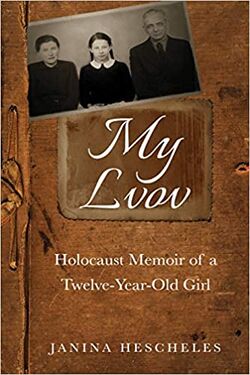Janina Altman / Janina Hescheles (F / Poland, 1931), Holocaust survivor
Janina Altman / Janina Hescheles (F / Poland, 1931), Holocaust survivor
- KEYWORDS : <Lwow Ghetto> <Hidden Children>
- MEMOIRS : My Lvov (1946) -- The Root and the Bough (1949), 277-283
Biography
Janina Altman (née Hescheles) was born 2 January 1931 in Lwów, Poland (now Lviv, Ukraine). anina Hescheles' father, Henryk Hescheles, was a journalist in Lwów and publisher of the Polish-language Zionist periodical Chwila.[1] Her mother was registrar at a hospital on Józef-Dwernicki Street, and after the outbreak of World War II also served as a nurse.
The family lived with her grandparents in the Jewish Quarter of Lwów, a city which at the time was about one-fourth Jewish.[2][3] When Nazi Germany invaded Poland in September 1939, Hescheles' uncle, Marian Hemar, a brother of her father, was able to flee from Warsaw to Great Britain. In 1939, under terms of the Nazi-Soviet Pact, Lwów was annexed to the Soviet Union, becoming part of Soviet Ukraine.
The day after the Germans invaded the Soviet Union in June 1941 and conquered Lwów, Hescheles' father was murdered in a pogrom perpetrated by the Ukrainian population of Lwów.[4] However, another uncle, Stanisław Lem, managed to conceal his Jewish heritage and survived. Janina Hescheles and her mother survived the pogrom. Then they and Hescheles' grandparents and other relatives were imprisoned by the Nazis and forced to work in the German armaments factories. However, with help from the writer Michał Borwicz and the Polish resistance organization Żegota, she was able to escape from the Janowska concentration camp in October 1943.
Janina was hidden by various families from Kraków (Cracow) in an orphanage in Poronin, in southern Poland. Three weeks after her escape, with encouragement from Borwicz, Janina Hescheles began writing a memoir of their persecution in Lwów. In 1946, soon after the war ended, the diary was published in Polish.
In 1950, Hescheles emigrated to Israel, where she eventually earned a doctorate in chemistry at Technion (the Israeli Institute of Technology). She married the physicist Kalman Altman, and they had two sons. Hescheles (now Janina Altman) continued to work at Technion and the Weizmann Institute of Science, and also at the Technical University of Munich, Germany.
Book : My Lvov (1946; ET 2020)
- Janina Hescheles, Oczyma dwunastoletniej dziewczyny ("Through the Eyes of a 12-year-old girl") (Organization of Polish Jews in Kraków, 1946). German ed. Mit den Augen eines zwölfjährigen Mädchens (East Germany, 1958; West Germany, 1963). Since 2011 it was published in ten different languages. English ed. My Lvov: A Holocaust Memoir of a twelve-year-old girl (Amsterdam Publishers, 2020).
"Poland, 1943. Tragically orphaned Janina Hescheles recited poetry every night against the backdrop of Janowski camp’s burning bodies. Her haunting words catching the attention of the underground movement, she was smuggled to freedom just before the destruction of the site and the mass murder of its forced-labor Jewish captives. Concealed in Cracow and given writing tools to capture the brutal images in her head, the twelve-year-old began to faithfully record events and names of the dead ... Hescheles’ report opens in June of 1941 with the ruthless Nazi occupation of her beloved city, Lvov. Through vivid recollections, she meticulously details the enforced imprisonment of her friends, family, and neighbors in the Ghetto. Her unique account recalls a child’s painful longing for the mother and father she lost to the sadistic Third Reich ... In this courageous story of innocence taken so young, Hescheles reveals the stark daily realities of the horrific Jewish genocide. She was not afraid to be shot, but to be buried alive - the fate reserved for children. Written with descriptive immediacy during history’s ghastliest episode, this extraordinary notebook is an inspiring example of a Holocaust survivor bearing witness to the memories of a lost people. Complete with a recent forward, Hescheles exemplifies how life and hope can continue beyond unimaginable tragedy ... My Lvov: Holocaust Memoir of a twelve-year-old Girl is a fascinating memoir that brings an appalling event to life. If you like authentic first-hand reports, striking observations, and poignant reads, then you’ll love Hescheles’ childhood narrative."--Publisher description.
